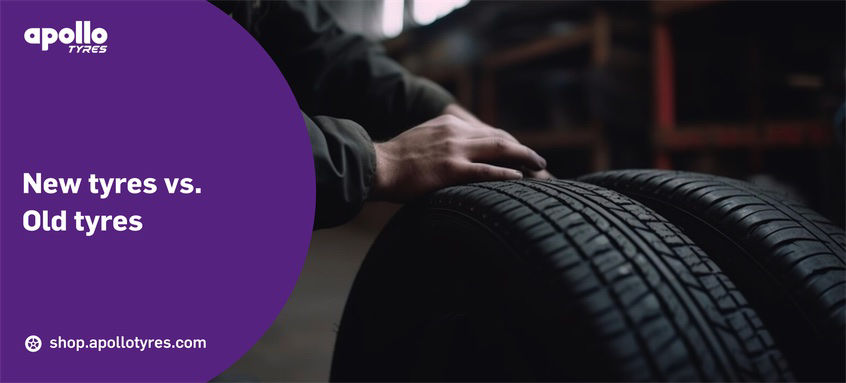
Table of Content |
When it comes to replacing worn-out or damaged tyres, many vehicle owners are faced with the decision of whether to opt for second-hand tyres or invest in brand-new ones. The debate between second-hand tyres and new tyres has been ongoing for years, with enthusiasts and experts on both sides presenting compelling arguments. In this article, we'll explore the pros and cons of both options and ultimately make a case for why new tyres are a better choice.
Quality and Safety:
One of the primary concerns when it comes to used tyres is their quality and safety. Unlike new tyres that undergo rigorous quality control checks, second-hand tyres might have hidden defects, internal damages, or weakened structures that aren't immediately visible. These defects can compromise the safety of the vehicle, especially during high-speed driving or adverse weather conditions. New tyres, on the other hand, are manufactured using the latest technology, ensuring top-notch quality and safety standards. When it comes to your safety and that of your passengers, investing in new tyres is a wise decision.
Tread Depth:
Tread depth is crucial for providing traction and grip on the road surface. Over time, tyres wear out, and their tread depth decreases. Second-hand tyres, particularly those that have already been used extensively, often have significantly reduced tread depth, making them less effective in providing the necessary traction. New tyres come with optimal tread depth, ensuring better performance and handling, especially in wet or slippery conditions. Improved traction can prevent accidents and provide a more comfortable driving experience.
Warranty and Longevity:
New tyres typically come with manufacturer warranties that guarantee their performance and lifespan. In the event of defects or premature wear, these warranties offer peace of mind and financial protection. On the other hand, second-hand tyres rarely come with any warranty, leaving buyers vulnerable to unexpected issues. Additionally, new tyres have a longer lifespan, providing better value for money in the long run. They are designed to endure the rigors of daily driving for an extended period, ensuring consistent performance over time.
Fuel Efficiency:
Properly inflated new tyres contribute to better fuel efficiency. When tyres have the right pressure and tread depth, the vehicle requires less effort to move, leading to reduced fuel consumption. Second-hand tyres might already be underinflated or have uneven wear patterns, negatively impacting fuel efficiency. By investing in new tyres, you not only enhance your safety but also save money on fuel costs in the long term.
Environmental Impact:
Choosing new tyres over second-hand ones also has positive environmental implications. Manufacturing processes for new tyres have become more eco-friendly over the years, focusing on sustainable materials and energy-efficient production methods. Additionally, new tyres are more recyclable, reducing the environmental footprint. When you opt for new tyres, you are indirectly supporting the tire industry's efforts to minimize its impact on the environment.
Cost-Effectiveness in the Long Run:
While the initial cost of new tyres might be higher than that of second-hand tyres, the long-term cost-effectiveness tips the scales in favor of new tyres. Considering their longevity, better fuel efficiency, and the reduced need for replacements and repairs, new tyres prove to be a more economical choice in the long run. By investing upfront in high-quality new tyres, you save on frequent replacements and potential repair costs associated with used tyres.
Also Read: When To Replace Car Tyres?
Conclusion:
In the ongoing debate of used vs new tyres, it is evident that new tyres offer superior quality, safety, and long-term value. While second-hand tyres might appear to be a cost-effective option initially, the potential risks and expenses associated with their use far outweigh the initial savings. When it comes to the safety of you and your loved ones, the choice is clear: new tyres are the way to go.
So, the next time you find yourself in need of new tyres, consider the long-term benefits and peace of mind that come with investing in high-quality, brand-new ones. Your safety, vehicle performance, and overall driving experience will undoubtedly be better for it. Remember, when it comes to your tires, it's always better to be safe than sorry. Choose new tyres and drive with confidence on the road.
FAQs:
Q1. How do new tyres affect vehicle handling and braking?
Ans: New tyres significantly improve vehicle handling and braking. They offer better traction due to deeper treads, which enhance grip on the road, especially in wet or slippery conditions. This improved traction leads to more responsive steering and better cornering. Additionally, new tyres provide shorter stopping distances because their treads are more effective at channelling water away, reducing the risk of hydroplaning. Overall, new tyres' enhanced grip and stability contribute to safer and more controlled driving experiences.
Q2. How long do new tyres last compared to used tyres?
Ans: New tyres typically last between 40,000 and 60,000 miles, depending on driving habits, road conditions, and maintenance practices. In contrast, the lifespan of second hand tyres varies widely based on their condition when purchased. A used tyre with half its tread life remaining may only last 20,000 to 30,000 miles. New tyres offer predictable longevity and performance, whereas used tyres can have unpredictable wear patterns and shorter lifespans, making them less reliable in the long term.
Q3. Are there any insurance benefits to choosing new tyres overused ones?
Ans: Choosing new tyres vs used ones can offer insurance benefits. New tyres enhance vehicle safety by providing better traction, handling, and braking performance, which can reduce the likelihood of accidents. This increased safety can potentially lower insurance premiums as insurers often consider the condition of your vehicle's tyres when assessing risk. Additionally, in the event of an accident, having well-maintained new tyres might support claims, demonstrating responsible vehicle upkeep and potentially preventing claim disputes. New car tyres are a much safer options than second hand car tyres.

